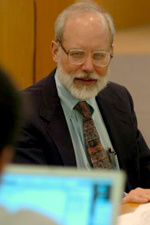
A team from the University of Iowa College of Law is working with law schools in Tajikistan to strengthen the Central Asian country’s form of legal education and, ultimately, its entire legal system.
The law school will host seven professors from Tajikistan’s three law schools next week, providing them with insight into how U.S. law schools teach the law. This follows a trip last May to Tajikistan by John Reitz, a law professor and expert in the comparative study of foreign legal systems, and Iowa City resident Kunduz Asanova, a former professor of law in Kyrgyzstan and a graduate of the law school’s masters program. They spent a week with Tajik law professors discussing the U.S. legal system and legal education in both countries.
Tajikistan is a former Soviet republic that has struggled following its independence in 1991 and a lengthy and devastating civil war. The country is mostly mountainous, and is strategically important to the United States because it borders Iran, Afghanistan, and China. The country also hosts several NATO military units involved in the war in Afghanistan.

Reitz says the professors have been learning about the U.S. legal system, its history and constitutional jurisprudence, and especially its independence from other sources of political power. He says the meetings with the Tajik professors next week will focus largely on teaching methods but will also expose the Tajik visitors to the American system of criminal justice, including some visits with local judges and prosecutors or defense lawyers.
The professors will sit in on classes designed to orient first year law students the week of August 12 and foreign-trained master’s students to the U.S. legal system, as well as trial advocacy classes. They will also meet with teachers in the UI clinical law program. Reitz says he hopes they see a different relationship between the student and professor from what exists in Tajik law schools. There, he says law schools are based on the old Soviet model of legal training, which is heavy on learning laws and rules but not on encouraging lawyers to think about what they’re memorizing or to interact with their professors.
“The primary idea there is to transmit information to students,” he says. “Here, the idea is that we listen to our students, that they have a chance to talk with us and respond to our teaching. We teach by persuading and engaging our students; we want students to learn to think on their own.”
In the end, he said the hope is to help strengthen democracy in Tajikistan.
Education is such an important place for reform efforts, he says, because “the key to a democratic society is listening to other ideas and respecting them. Democracy starts with human relationships.”
The Tajik visits are sponsored by the American Bar Association’s Rule of Law Initiative, which promotes the rule of law in developing countries as the most effective long-term antidote to the most pressing problems facing the world today, including poverty, conflict, endemic corruption, and disregard for human rights.
In addition to Reitz and Asanova, clinical law professor John Whiston and clinical fellow Nathan Miller helped to organize the Tajik professors’ visit to Iowa. The UI teachers hope that this visit will lead to future collaboration with Tajik law schools, possibly through joint clinical programs.